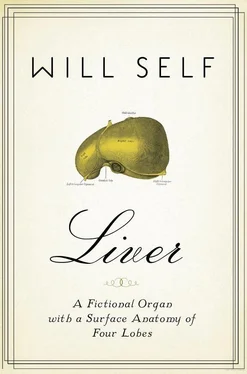At the St Charles, the gloomy Victorian hospital in back of Ladbroke Grove where Val ended up, a junior registrar had to give him a shot of Ativan to stop him fitting. She was no expert on this spectacular form of self-abuse, which involved relentless terrorist attacks on the temple of the body; but then few are. However, even a cursory examination of Val’s dropsical body was enough to tell her that: ‘This, uh, man — Mr Carmichael, is so close to suffering a portal haemorrhage. Well, I don’t suppose. ’ She looked up from the bed, where Val’s head, a crushed grape, lay on the pillow. ‘Mr?’ she queried.
‘Stenning,’ the Martian replied matter-of-factly. ‘Peter Stenning. Val — Mr Carmichael — is my cousin. And, yes, I do know what a portal haemorrhage is.’
Although while in the dusty confines of his adoptive habitat the Martian was notable for his tranquillized manner, strange to relate that here in the St Charles he appeared studiously efficient. And while in the tawny interior of the club his garb and even skin had a tinge that matched his greenish hair, in the cold-old light of the general ward he didn’t look like anything much: just another late-middle-aged, middle-class man wearing slightly anachronistic spectacles and a suede jacket.
There was little to be done with Val, so the medical staff did nothing: there was no heroism in giving this spavined old nag a painless trip to the knackers. The Martian, however, did plenty. He had told the junior registrar that he was Val’s cousin, and, since he was so willing to undertake the palliative care that they couldn’t be bothered with, they saw no need to inquire any further when he signed the relevant paperwork as next of kin.
The Martian had Val moved to a private room. He gently petitioned the doctors for all the medication necessary to make the dying man comfortable. All agreed that in the case of this most determined waster of it, it was only a matter of time. A matter of time before pancreatitis, hepatorenal syndrome, hepatitis, cancer and, of course, cirrhosis jostled together in Val’s engorged liver, kidneys and gall bladder, and, finding a common pathway out, ruptured the walls of his weakened arteries, so that blood gushed into his throat and drowned him.
It was only a matter of time, but, despite waiting for decades now, the Martian was succumbing to a mounting impatience. He went down to the convenience store on the corner of Cambridge Gardens and bought quarter-bottles of vodka; a tacky brand called something mock-Slavic like ‘Gogol’, but that hardly mattered at this stage. It was also a hot summer, but that didn’t matter a damn either.
The Martian fed Val tiny sips of the burning spirit through a straw, and the patient croaked his gratitude. No one else came to see him — not that he would have been able to recognize them if they had. The Plantation Club members had a well-justified fear of hospitals, given that any self-respecting mental health practitioner would’ve sectioned them more or less on sight.
Her Ladyship, escorted by Hilary, did make it as far as the main lobby of the St Charles; there, upon seeing an immunization flyer that depicted a doting mother and her winsome baby, she was utterly overcome by her own pathological self-pity and had to adjourn to the nearest pub for much needed medicinal gin.
Hilary himself couldn’t have given a toss about Val. He would only have entered the queerly shaped nook where Val lay — the result of eras of partitioning — in order to press a pillow over Val’s horror mask and extinguish his flame-red nose for ever.
But he didn’t have to, because the Martian was doing the job for him. Between trips to the offie, the Martian sidled about the St Charles. In an environment at once hurried and yet desultory, the staff barely noticed this nondescript figure; while if a clamp went missing here, and a scalpel there, then they barely noticed that either.
Over several days the Martian assembled all the equipment he wanted and stashed it in the cupboard in the corner of Val’s nook. Each evening, when visiting hours were over, he went back to his house on Melrose Avenue, off Shoot Up Hill. If our chance wanderer — last seen lurking in the vicinity of Blore Court — had happened to creep through the overgrown front garden to the bay window, he would have seen a curious spectacle through its scummy panes: the Martian, standing stock-still in the middle of a completely empty room, waiting, hour upon hour, for the dawn.
On the morning of the day Pete Stenning killed Val Carmichael, he left his house as usual and travelled by minicab to Lidgate’s, the organic butcher’s on Holland Park Avenue. Here he collected a pig’s liver that he had ordered by telephone.
The Martian doubted that the pathologist at the St Charles would wish to conduct a post-mortem: the uncertainty, in Val’s case, would concern not the cause of death but how his life had been maintained for so long. Even if they did perform an autopsy, the pig’s liver might still fool them.
There was also the undertakers to be considered. Embalming was not an issue — Val’s cadaver was to be cremated forthwith — but the Martian knew some of them could be sharp-eyed; and some liked to handle corpses — that’s why they took on the job. They left it to colleagues to honour the dead and comfort the living, while they poked about in the cremulator.
The Martian wasn’t too bothered if his subterfuge was discovered. He was not an entity characterized by a sense of humour, let alone irony, but he did like to leave his mark. Much as Trouget blobbed three dots of paint in the bottom-right-hand corner of his canvases — thereby increasing their value ten-thousandfold — so the Martian considered his transplants a form of signature.
The Martian had a good feel about this morning, believing he had got his timing exactly right. He stopped at the convenience store for a bottle of Gogol that he concealed in the inside pocket of his suede jacket. Even this late in the procedure there was still the possibility of discovery and that would make things. awkward.
The pedestrians hurrying towards Ladbroke Grove tube station swarmed past the Martian not like flies — such an image suggests fat and hairy bluebottles — but midges fizzing over a puddle; while the vehicles coursing in the roadway had all the mass and heft of mosquitoes dallying above diaphanous netting. It was the same at the St Charles, where the medical and auxiliary staff swarmed through the corridors much as termites pullulate in a mound, while the patients lay in their beds: black and white grubs, nourished with pap.
The Martian moved through all this mini-beastliness decisively. If our chance wanderer had been back on hand, and noticed that this otherwise forgettable man, with his greenish hair — the result, no doubt, of a duff dye-job — seemed out of joint with his surroundings — or, more specifically, out of time with them: jibing the underlying biological rhythms of human life — then that would have been a very fine piece of observation.
For, while one of the reasons the Martian had chosen the Plantation as his sphere of activity, and Val Carmichael as the subject of his attentions, was that the very stasis of the club — where it could take the best part of an afternoon for a member to make it from bar to toilet and back again — made it easier for him to calibrate to the behaviour of creatures who were, to him, as mayflies are to us, none the less, he had disciplined himself so well that he could not only communicate with them — a prerequisite, all would agree, of any successful animal husbandry — but also engage in intercourse with those creatures who were, to humans, as frenetic and transitory as we are to him.
The Martian could catch a fly in his nicotine-stained fingers — and talk to it.
Читать дальше












